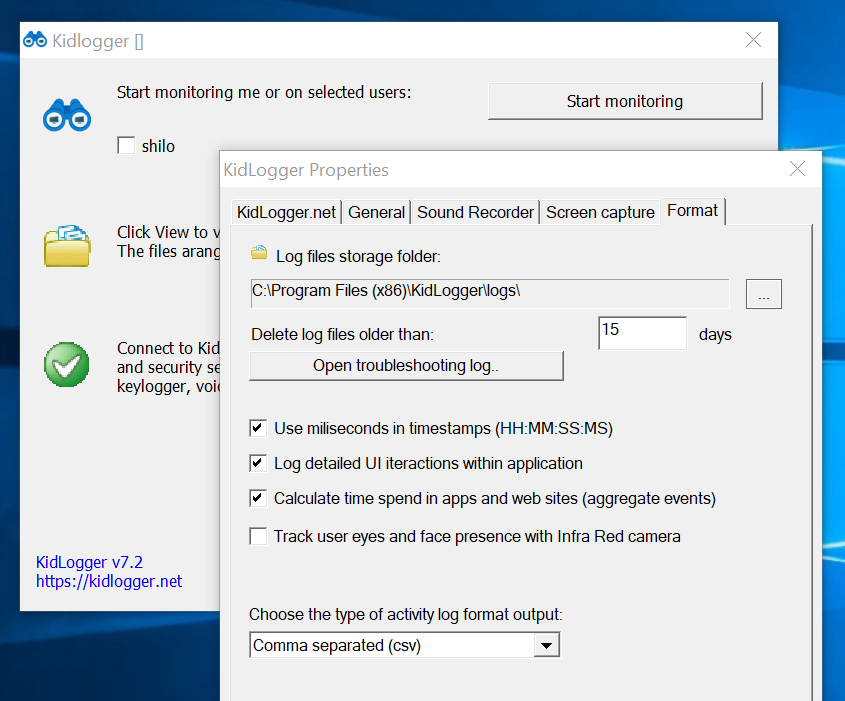Using KidLogger for scientific research
KidLogger has been contributing to the global computer monitoring landscape since 2001, when it was first released as a free keylogger. From the beginning, it recorded not only typed text, but also the chronology of applications used. In 2010, KidLogger evolved into an online Parental Control service for monitoring computer and smartphone usage. Since 2016, the software has also been adopted by the scientific community for machine learning experiments that require large datasets describing human-computer interaction.
Today, researchers around the world use KidLogger to study psychometric models of behavior based on digital footprints — including keyboard activity, mouse clicks, software usage patterns, and website visits. A central research question is how the temporal dynamics of computer activity correlate with personality traits, particularly those defined by the Big Five model (openness to experience, conscientiousness, extraversion, agreeableness, and neuroticism).
Another growing area of study involves the impact of multitasking and digital distractions on stress and productivity. For instance, researchers have found that social media can negatively affect students’ moods and concentration — reinforcing the need for continued exploration of how online environments shape behavior.
Digital behavior tracking also helps identify other influencing factors among knowledge workers, such as sleep duration, cognitive load, or motivation. The scientific community is working on more accurate ways to collect, process, and analyze digital activity to refine behavioral models. Industry sectors are increasingly interested in measuring decision-making processes and detecting behavioral patterns of privileged users in critical IT infrastructures. These insights have valuable applications in cybersecurity, digital forensics, and continuous authentication systems.
In education, KidLogger has also been explored as a tool to track student engagement, uncover gaps in learning, and assess professional ethics — for example, among translators.
What KidLogger Records
KidLogger logs all user activity on a computer or smartphone in chronological order. The recorded data is used as input features for machine learning models. The digital footprint may include:
- Start and end times of computer usage;
- Duration of software usage, time of switching between programs;
- Activation time of window titles;
- Timing of pauses during text input;
- Website visits, active time, and tab switches;
- Mouse movements and clicks;
- Keyboard events with context (active app or website);
- Communication (e.g., Skype messages, incoming/outgoing);
- Browser plugin tracking: scrolling, clicks, hover actions, UI response times;
- Eye tracking data (IR camera, Windows 10 only);
- Periodic screenshots and webcam snapshots;
- Microphone recordings to detect voice activity.
KidLogger can export data in CSV, JSON, and HTML formats with millisecond-level precision.
Creating Datasets with KidLogger
KidLogger makes it easy to generate datasets for research or machine learning. After installing the program, open the settings and go to the Format tab. You can configure millisecond precision and select which types of events to log, depending on the features you need for your model.
By default, KidLogger works locally without requiring a cloud connection. Monitoring and data storage can be managed entirely on the local device.

How to record a dataset in CSV or JSON files
KidLogger allows exporting collected data and features into CSV or JSON files for further processing. The data, i.e., future features, include the date and time of the event, type, name, title, duration, and event attributes.
Mouse events, 'mouse' tag:
mouse,13:24:00:526,notepad, Move ,1437:945
mouse,13:24:00:558,notepad, Move ,1354:849
mouse,13:24:00:590,notepad, Move ,1313:806
mouse,13:24:00:621,notepad, Move ,1295:776
mouse,13:24:00:646,notepad, Move ,1278:738
mouse,11:08:53:474,notepad, Scroll ,689:728
mouse,11:16:23:698,notepad, Click ,144:30
where 'notepad' is the name of the active process.
Keyboard events, 'keystroke' tag:
keystroke,13:19:34:7,notepad,t
keystroke,13:19:34:91,notepad,y
keystroke,13:19:34:459,notepad,p
keystroke,13:19:34:932,notepad,i
keystroke,13:19:34:940,notepad,n
keystroke,13:19:34:992,notepad,g
Selecting the current program UI, 'app' tag:
app,13:25:47:854,notepad,Untitled - Notepad
At the specified time, the user selected the program with the title 'Untitled - Notepad'.
User selection of a website (URL selection), 'url' tag:
url,11:16:23:625,0,https://mail.google.com/mail/u/0/#inbox,Incoming (96) - test@gmail.com - Gmail - Google Chrome
Other tags: system, folder, mp3, idle, jpg, chat
Local KidLogger Server
The Local KidLogger Server enables centralized data collection from multiple devices located within schools, departments, or other organizational units.
It allows you to gather data for a single user from multiple devices — such as smartphones and computers — and merge this information into a unified activity log. This capability simplifies contextual research and behavioral analysis across different platforms.
Data Export: Monitoring data is available in SQL table format for further analysis and integration.
Open-Source Monitoring Tool
We welcome collaboration with educational institutions and research organizations. Upon request, we are ready to provide access to the latest source code of the KidLogger client applications and server components. Additionally, we offer support for research projects through experimental user monitoring features.
Selected References Using KidLogger
The following list highlights past research projects and academic studies where KidLogger was utilized. These references demonstrate the tool’s practical applications and the breadth of its contribution to behavioral research.
List of publications to be inserted here.
- Detecting Multitasking Work and Negative Routines from Computer Logs
- Strictly by the Facebook: Unobtrusive Method for Differentiating Users
- Digital footprints: predicting personality from temporal patterns of technology use
- Stress and multitasking in everyday college life: an empirical study of online activity
- Sleep Debt in Student Life: Online Attention Focus, Facebook, and Mood
- Development of an Application for Mobile Devices to Record Learner Interactions with Web-Based Learning Objects
- Collecte, traitement et analyse de traces pour identifier la circulation de pratiques numériques des lycéens
- Workstation Analytics in Distributed Warfighting Experimentation
- More friends, more interactions? The association between network size and interactions on Facebook
- "LA TRADUCCIÓN DE FRASEOLOGISMOS EN EL AULA DE TRADUCCIÓN GENERAL "Gisela Marcelo Wirtnizer José Jorge Amigo Extremera
- Exploring mobile device usage patterns by using the FANN neural network library